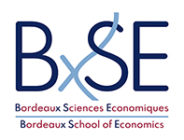Séminaire d’économie de Bordeaux
José Luis Torres
(Université de Malaga)
Optimal Path for Orbital Debris
Abstract: This paper introduces the DISE-2024 (Dynamic Integrated Space Economy) model, an Integrated Assessment Model (IAM) designed to analyze the economics of efficient mitigation policies for orbital debris. The DISE-2024 model integrates an optimal neoclassical economic growth framework with a physical model of the Earth’s orbital environment, capturing the dynamics of orbital debris and the likelihood of collisions. The economic component of the model determines the optimal consumption path and investments across two capital assets: Earth capital and space capital (i.e., satellites). The physical component models the endogenous generation of orbital debris, accounting for factors such as launch activity, in-orbit breakups, and collisions. The model is simulated over a 200-year horizon under various policy scenarios, including no intervention, de-orbiting policy, no breakups, reusable launch vehicles, debris-free launch systems, collision avoidance, and the European Space Agency’s (ESA) zero debris policy. A key finding of the study is that mitigation policies targeting debris emissions alone have a limited impact on reducing the long-term accumulation of orbital debris. Only scenarios involving complete collision avoidance can prevent the catastrophic chain reaction predicted by Kessler syndrome.
>> Changement de salle : Salle H1-102 (bât H1, 1er étage) <<
– Séminaire organisé par le programme 2 / BSE –
>> pour assister au séminaire via Zoom, contacter julie.vissaguet@u-bordeaux.fr



